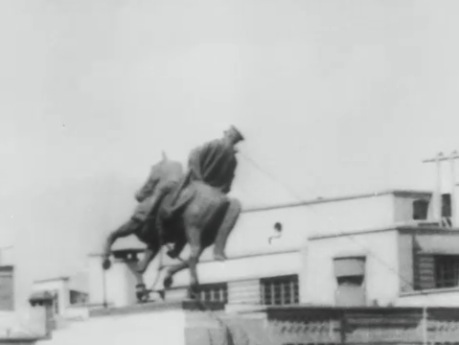[credit]‘Persian cavalrymen turn their steeds in flight in a battle against Alexander’ by Antonio Tempesta, Florence, 1608. From Alexander’s Tomb.[credit]
The Palestine/Israel and U.S. narratives on Palestinians coincided in a haphazard way this month. While the popular resistance committee in the village of Nabi Saleh mourned the killing of Mustafa Tamimi, which it named its first martyr, an American presidential candidate resurrected the British Mandate-era mythos about the ‘invented’ Palestinian people.
Joe Sacco in Mondoweiss:
The Israelis are still blockading Gaza. They control things that are going in, they control to a large extent, the goings and comings of people, and they’re blockading Gaza. So people have a doubly miserable life. It’s miserable from the inside, I would say, and it’s miserable because of the external pressure. And then you hear someone like Newt Gingrich say something like ‘the Palestinians are an invented people,’ and these people are terrorists, and you realize that there’s still people in public office, or who had public office in this case, running for president, who feel they can say this sort of thing because it’s okay to disparage the Palestinians in this really disgusting way.
In Gingrich’s orbit of rhetorical muck it’s also okay to disparage African-Americans and the poor with impunity.
Chauncey DeVega in We Are Respectable Negroes:
Newt Gingrich has repeatedly demonstrated that he is an existentially ugly person. Therefore, his repeated comments about the black poor, and ‘inner city’ communities, where people ‘don’t have a work ethic’ are not at all a surprise. Primarily,Gingrich is recycling the ugly and deeply racist belief that black people are inherently lazy: poor children who don’t see people around them working apparently grow up to be lazy adults, who are on welfare, dependent on the state, and have no understanding of how to put in an honest day’s work. In all, Newt Gingrich is offering up aDickensonian fantasy of workhouses in which African American wastrels and street urchins learn the value of hard work from benevolent white folks like him.
Vigils for Tamimi were commemorated internationally (we organized a candlelit memorial seven days after his killing in Cambridge, MA) including in Tel Aviv, though it would shock no one that mourners at his funeral procession from Ramallah to Nabi Saleh were teargassed, ferociously beaten (as well as stamped on their heads), and arrested by the World’s Most Moral Army (some images of those scenes, including the one below, here).
Holly Rigby on Tamimi’s funeral (converging with Israeli Central Command spokesperson Major Peter Lerner mocking his death):
As they tried to arrest more and more people the group of strong and defiant Palestinian women we were with threw their bodies over the men they were trying to drag away, and the soldiers began dragging these women by their hijabs, their clothes, wringing the necks of the men who were under this pile of women and trying to pull them from underneath. Covering and protecting the bodies of those trying to be arrested, the women were screaming so loudly for the soldiers to stop and this sound pierced my heart more deeply than any sound bomb could ever have done.
Narratives which pin unbridled violence on the uniformed lionhearts can be confusing.
From his introductory essay in an important volume of Zapatista writing (I don’t love everything about this piece, such as its pseudo-stereotypical description of the ‘simplicity of the [indigenous] grouping, feeling and thinking together,’ but the historical range it presents is still compelling), José Saramago’s ‘Chiapas, a Name of Pain and Hope’ expounds on invented Persians.
In 1721, with a feigned innocence that couldn’t conceal his tart sarcasm, Charles-Louis de Secondat asked, ‘Persians? But how is it possible for someone to be Persian?’ It’s been almost 300 years now since the Baron de Montesquieu wrote his famous Lettres Persanes, and even today we haven’t succeeded in putting together an intelligent answer to this most essential of all questions on the historical agenda of human relationships. As a matter of fact, we still can’t understand how it was ever possible for someone o have been a ‘Persian,’ and furthermore, as if such a peculiarity were not out of the question, to persist in being one today when the world seeks to convince us that the only desirable and profitable thing to be is what in very broad and artificially conciliatory terms is customarily called ‘Western’ (in mentality, fashions, tastes, habits, interests, manias, ideas)—or, in the all too frequent case of not succeeding in reaching such sublime heights, to be “Westernized” in some bastard way at least, whether through force of persuasion or in a more radical way, if persuasion should fail.
To be ‘Persian’ is to be something strange, someone different—in simple terms to be the ‘other.’ The very existence of the Persian has been enough to disturb, confuse, disrupt, and perturb the workings of institutions: the Persian can even reach the inadmissible extreme of upsetting what all governments in the world are most jealous of: the sovereign tranquillity of their power.
The indigenous were and still are Persians in Brazil (where the landless now represent another type of Persians). The indigenous in the United States once were but have almost ceased to be Persians. In their time Incas, Mayas, and Aztecs were Persians, as were and still are their descendants, wherever they have lived and still live.
The Guardian has released historical footage from the British Pathé digital archives. I was deeply struck by two short reels in particular.
In the first, British troops in Nablus in ‘disturbed’ Arab districts deign to interrupt their innocuous game of football in order to corral the unruly natives. (If you think I’m editorializing just watch the footage.)
In the second, the British-backed coup of Mohammad Mosaddegh is re-imagined as a salient regime change while Mosaddegh himself—a wildly popular democratic figure and the first prime minister to nationalize a prime resource in Asia—is painted as ’virtual dictator of Iran.’ The Iranians themselves are little more than ‘rioters.’
If I can be forgiven for stating the unadorned obvious, the ‘invention’ of 18th-century Persians and 20th-century Palestinians and every-century black people has everything to do with the self-invention of the inventor. Fabricating the victor and the vanquished is neither particularly new or novel but it appears to proliferate when an erstwhile politician or still-born political establishment attempts to seize power, and in doing so, must regenerate counterfeit but powerful narratives about the ‘Persian’ other whose pesky existence as a survivor has been enough to disturb, confuse, disrupt, and perturb the workings of institutions.


